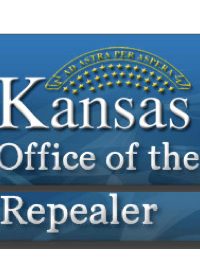
By his first executive order, Governor Sam Brownback appointed Dennis Taylor to the new office of Repealer, to cut the size of government and reduce its intrusion on the people and economy of the Sunflower State.
The website for the Kansas state government now includes a tab for the Repealer, which, when clicked, states:
If you believe that an unreasonable, unduly burdensome, duplicative, onerous or conflicting law, regulation or other governing instrument, detrimental to the economic well-being of Kansas, exists, please provide us with information in the fields below.
Please enter your information and the law, regulation, or rule that you would like to have reviewed.
During a luncheon at the Wichita Pachyderm Club, Taylor explained what has already been done to improve the efficiency of the Kansas Department of Administration, adding that he expects approximately 300 repeal recommendations to be delivered soon.
A few of the recommendations some of which have been rejected include laws requiring seat belts, leashes in state parks, payment by veterinarians of X-ray inspection fees to the Kansas Department of Health, charges for trespassing while intoxicated, payment by newspapers of sales tax on mailed copies based on the recipients location, publishing of certain data in newspapers by county appraisers, and the charging of universal service fees on phone bills to provide landline phone service in rural areas.
My all-time personal favorite, Taylor observed, is regulation 19-825 … a 1911 regulation which has never been taken off the books, having to do with lynchings, which certainly is outmoded.
Kansas has its own process for examining and repealing legislation, which is normally conducted by the Legislative Division of Post Audit (LPA); however, according to Taylor, that agency requires permission from a joint committee of legislators in order to proceed. Its a cumbersome process,” he noted, “because legislators tend to defend laws they voted on. LPA can only look at what the LPA Committee approves. Even getting something to be looked at by LPA is sometimes a little difficult and certainly requires a lot of compromise.
The Repealer, on the other hand, may act on any suggestion, and then send his own proposals to the originating body of such law, regulation, or other governing instrument for action. The Executive Order declares, Recommendations made by the State Repealer shall carry the full weight and force of this Administration.
Taylor also indicated that a March 7 executive order, which garnered minimal media attention, outlines the approach that he and Brownback will take to streamline the state government. As noted by the Kansas City Monitor, The order transferred responsibility for all human resource departments under the Governors jurisdiction to the Department of Administration.
Taylor pointed to his own experience as Labor Secretary under Gov. Mike Hayden to explain the necessity for the order: We all ran these agencies as little fiefdoms instead of one big enterprise.
Additionally, the HR staff swelled at the Department of Administration from 20 to 170, while other state agencies were attempting to make cuts by shrinking their staffs.
If you have everything aggregated together you can make those 170 really only 140 or 130 because you … have a greater opportunity for greater efficiency, greater support for one another, he explained. Its that sort of spirit, on a broader basis, statewise, that were working on in the department and [that we] then have the intention to translate into other parts of state government, whether that be in other support functions that are my responsibility or to the office of the Repealer.
Governor Brownback has already moved to reduce the number of state employees by offering 4,000 workers incentives for early retirement: up to five years of their current health coverage or a one-time lump sum payment of $6,500 cash.
Taylor noted the incentive program was entirely voluntary: The administration will not make any recommendation that an employee choose to offer to retire.
Though the offer will remain on the table until September 2, few are optimistic that many will take advantage of it. According to quarterly statistics compiled by the U.S. Bureau of Labor and the Census Bureau, just 11 percent or less of the state’s government workers leave their jobs each year, compared to the 18 percent or more in the private sector.
The Kansas Organization of State Employees (KOSE) has already voiced its objection to the early incentive program in a press release: The State is required, by Kansas statute and by contract, to meet and confer with the Union over any changes to conditions of employment, such as salaries, hours of work, retirement benefits, and insurance benefits.
Taylor and Brownback have high hopes for the new Repealer office. Aware that it is the nature of government to grow exponentially and increase laws and regulations, Taylor contends that it is necessary to remain vigilant against that process:
In that spirit our office stands as an effort to try to be responsive to those that feel theyre unfairly targeted or burdened by a law that has little rationale or perhaps less rationale than when it was originally passed by the Legislature.




